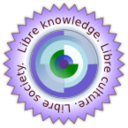Libre knowledge
Libre is a loan word in English borrowed from various Romance languages, including Spanish and French. As in these languages, "libre" in English denotes "the state of being free", as in "having freedom" or "liberty".
During the mid to late 1990s, and moreso during the first decades of this century, the word libre acquired a very specific meaning within certain free/libre and open source software communities[1]: free as in freedom (gratis)[2] - distinct from the other meaning of free, free of charge (gratis).
Software is a form of knowledge, culture is an expression of our collective knowledge. Although this collection of pages concern libre knowledge, the principles also apply to libre culture and other libre initiatives inspired by the free software movement.
When searching the web for information on libre software, libre knowledge, and libre culture, etc., also try the adjectives "open" and "free", though some of the links returned might be less about the essence of the libre movement (freedom) and more about practicalities (e.g. price and the open source development model).
| Libre Knowledge | |
| Wikipedia has an article on this subject.
Visit Libre Knowledge for more in depth information |
Libre Knowledge Definition
Libre Knowledge (aka free knowledge) can be acquired, interpreted and applied freely, it can be re-formulated according to one's needs, and shared with others for community benefit. In today's world, where knowledge may be captured and shared electronically, this freedom is not automatically preserved, and we elaborate this definition for explicit knowledge:
(explicit) Libre Knowledge is knowledge released in such a way that users are free to read, listen to, watch, or otherwise experience it; to learn from or with it; to copy, adapt and use it for any purpose; and to share the work (unchanged or modified) for the benefit of the community.
Representations of libre knowledge must be conveniently accessible for modification and sharing. For example, accessible, editable and deployable using libre software and libre file formats.
"Explicit knowledge" is knowledge captured on some medium, usually in a form representable on a computer (e.g. text, sound, video, animation, executable program, etc.).
Users of libre knowledge are free to
(0) use the work for any purpose
(1) study its mechanisms, to be able to modify and adapt it to their own needs
(2) make and distribute copies, in whole or in part
(3) enhance and/or extend the work and share the result.
A knowledge resource may be considered libre if users have all of these freedoms.
Freedoms 1 and 3 require the resource to be in a libre file format and be fully editable and deployable with libre software as defined by the Free Software Foundation.
See Also
References
- ↑ Quo vadis, libre software?, Jesús M. González-Barahona, v0.8.1, September 2004. Archived on 25 December 2012.
- ↑ See gratis vs libre on Wikipedia.
